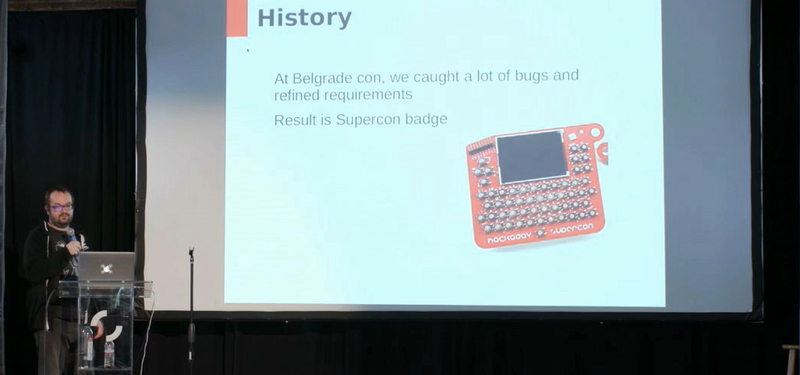If you missed it, the Hackaday Supercon 2018 badge was a complete retro-minicomputer with a screen, keyboard, memory, speaker, and expansion ports that would make a TRS-80 blush. Only instead of taking up half of your desk, everyone at the conference had one around their neck, when they weren’t soldering to it, that is.
The killer feature of the badge was its accessibility and hackability — and a large part of that was due to the onboard BASIC interpreter. And that’s where Jaromir comes in. Once Voja Antonic had finalized the design of the badge hardware for our conference in Belgrade in the spring of 2018, as Jaromir puts it, “all we needed was a little bit of programming”. That would of course take three months. The badge was battle-tested in Belgrade, and various feature requests, speed ups, and bugfixes were implemented (during the con!) by Jaromir and others.
Firmware work proceeded over the summer. Ziggurat29 helped out greatly by finding ways to speed up the badge’s BASIC interpreter (that story is told on his UBASIC and the Need for Speed project page) and rolled into the code base by Jaromir. More bugs were fixed, keywords were added, and the three-month project grew to more like nine. The result: the badge was in great shape for the Supercon in the fall.
Jaromir’s talk about the badge is supremely short, so if you’re interested in hacking a retrocomputer into a PIC, or if you’ve got a badge and you still want to dig deeper into it, you should really give it a look. We don’t think that anyone fully exploited the CP/M machine emulator that lies inside — there’s tons of software written for that machine that is just begging to be run after all these years — but we’re pretty sure nearly everyone got at least into the basement in Zork. Dive in!
















https://www.youtube.com/watch?v=4OcM23Hbs5U
You have to be careful these days using #ifdef to eliminate screen output (or any other kind of output for that matter) because gcc (and most other decent optimizing compilers) will detect cases where the output you #ifdef’d away was the only externally visible side effect of a computation and optimize the entire computation away.
Two good ways to avoid this problem when doing this sort of tuning are:
1) make a dummy version of your output library and a real one and compile them both separately and link to one or the other as needed (without link-time optimization).
2) write all output to a mmap()’d buffer for later collection and fill the buffer with a fill pattern before you start the benchmark timer so you force the OS to page in the backing pages for your output buffer (so the cost of paging them in doesn’t count against your program).
There are many other ways of detecting and sidestepping this (disassemble the binary to verify that the compiler isn’t being “too smart” for instance) but the two methods mentioned above are easy and fairly reliable.
very good project, and I’ve been looking for a very small scripting language (ie not the bloat of python or lua..).. :-)